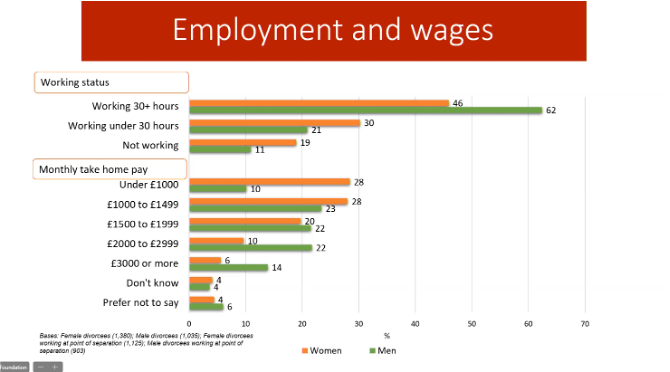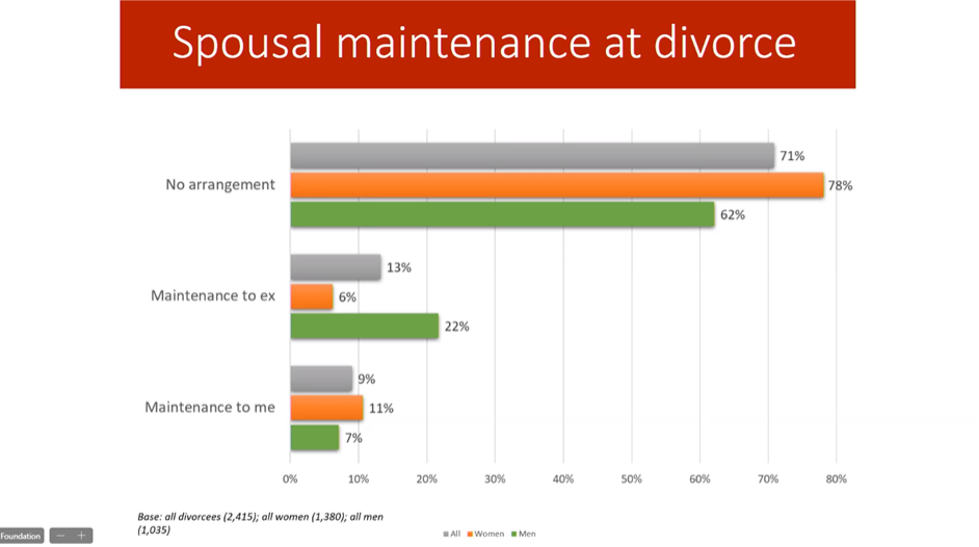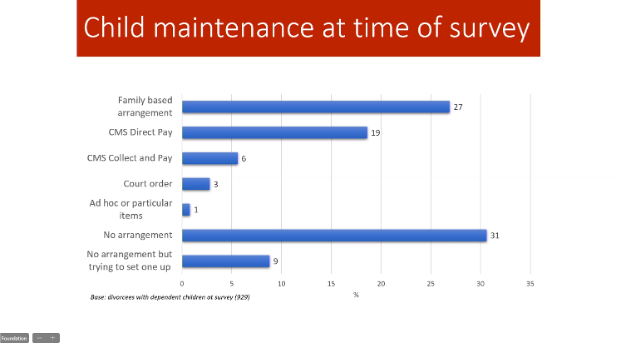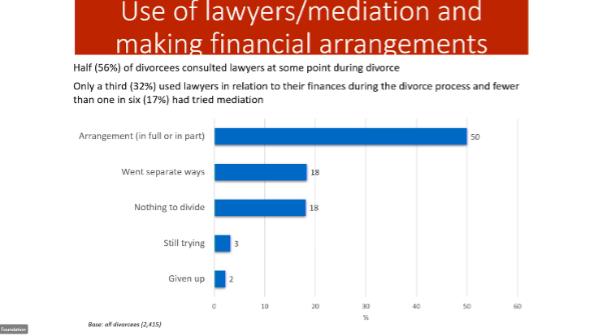Fair shares? Insights into how divorcing couples sort out their money and property…
During early November 2023, I was given the opportunity to attend (virtually) the “Fair Shares? Sorting out money and property on divorce” hybrid event organised by the Nuffield Foundation (who funded the project). This reported back on the results of the Fair Shares project, which is the first nationally representative investigation of the property and financial agreements made by divorced individuals in England and Wales. The goal of the Fair Shares research is to learn more about the property and financial arrangements made by divorcing couples, how these arrangements were reached, and how they handle the post-divorce setup. Professor Nicholas Hopkins of the Law Commission oversaw the panel discussion and introduced the Fair Shares team, which was led by Professor Emma Hitchings (Bristol University) along with Dr Susan Purdon and Caroline Bryson (Bryson Purdon Social Research) and Professor Gillian Douglas, Professor Emerita at King’s College London. The goal of the research was to supply crucial information to support current discussions on legal change. Additionally, it gave legal counsel, assistance, and supported providers with useful guidelines to help ensure that families’ financial requirements were better met in the future. Fair Shares’ research collected both quantitative and qualitative data, via methods such as surveys and 1-hour long interviews.
Below, I break down the key bits of research and try to share some of the research findings with you.
Going into the divorce
In relation to employment and wages, the research shows that women were less likely to have had full-time jobs. During their marriage, they are more likely to work part-time jobs or not work at all. Compared to their working husbands, women would typically take home less money. Women are therefore more vulnerable financially throughout divorce procedures.

Dividing the assets
The most frequent decision made regarding the house was to give one spouse ownership of it (46%); in cases where this was done, the wife—usually a mother—took ownership. According to interviews, the main reasoning for this was to keep the children in the one-family home, which would preserve stability and be the most logical choice given the couple’s financial situation.

Splitting the overall assets
Most couples divide up their assets unevenly for a variety of reasons, and this may be driven by personal demands or motivations like wanting ‘a new beginning’. The types of assets differed, but there were no significant differences in the shares between the genders. For instance, women were more likely than men to acquire higher home equity while men seemed to retain a larger portion of their pension savings. For both men and women, having a pension was linked to getting a bigger portion of the overall asset pool. Given that divorcees who themselves had a higher value pension tended to do better financially than those who had no pension or a lower value pension, this highlights the importance of having a sufficient pension when it comes to a divorcee’s financial status after the divorce.
Ongoing financial support
Within the research, only 22% of divorcees said they had spousal maintenance arrangements in place when they divorced. Not paying spousal maintenance was for a range of reasons. The cost of spousal payments was a concern for some, but for many, the matter was not a top priority during the divorce process. One of the main contributing factors is domestic abuse. In these circumstances, the victim would want to stay away from their abuser and avoid contact at all costs in the future.

Of the divorced parents in the study, a sizable minority (39%) either did not have a child maintenance agreement or were still in the process of establishing one. The main reason offered by parents for not making arrangements was that since they shared childcare, expenses were distributed amongst the involved parties. Child maintenance arrangements were made alongside the divorce process for most divorcing parents. Financially better-off individuals were more likely to have an arrangement than less well-off individuals. When their children reached adulthood and were no longer dependents, 84% of divorced parents continued to provide financial support for them.

The divorce process
Around half of all divorcing couples sought legal advice at some time during the process and around a third (32%) had consulted lawyers regarding their financial matters during the divorce process. Fewer than one in six (17%) had attempted the use of mediation.

My personal thoughts
One key aspect of the research that stuck out to me was the limited use of mediation. As a law student, studying at City, University of London, one of my most engaging modules has been ‘Mediation’ and we are taught that, in comparison to going to court, mediation is a faster, less stressful, and more affordable way for parties to resolve disputes. The fact that only 17% of divorcing couples tried mediation was something that bemused me, I questioned why mediation is a less common method used to settle divorce disputes?
I wanted a professional’s input into this, so I contacted family lawyer, Nailah Kausar for her input. She notes that ‘Mediation is used for financial remedy settlements‘ in her experience and quite often fails ‘because people don’t make reasonable offers to settle the case‘. She went on to say that during the mediation process, parties ‘may refuse to fully disclose financial documents which may lead the other party to be wary‘, causing settlements to fail. Nailah’s account certainly adds weight to the Fair Shares data on where divorcees obtain their legal information and advice. Lawyers are the most likely source of legal assistance for divorcing parties (40%) with only 12% using mediation. Along with Nailah’s insight, another key reason for the lack of use of mediation is domestic abuse. If there have been any instances of domestic abuse or if there are still unsolved abuse allegations, mediation is typically not appropriate as the victim would wish to distance themselves from their abuser and refrain from communicating with them in the future. In addition, when one party refuses to mediate, mediation tends to be ineffective. It is entirely voluntary to mediate. One party cannot be made to participate in mediation if they do not want to.
Concluding the event
As the virtual event came to an end, I started to reflect on the informative findings that the Fair Shares research team had given about property and money on divorce. It is important to highlight that divorcees’ lack of financial and legal understanding is a major problem that requires addressing. There need to be far better options for obtaining reasonably priced legal advice and information so that couples have a clear idea of the matters that should be their primary concerns, such as pensions and assets. Although mediation is more private and gives parties more control over the resolution than going to court, the study shows that its use is not always appropriate in certain situations, such as when there has been domestic abuse or when there is a lack of commitment from both parties as a result of intense disagreements. This virtual event provided by Fair Shares has only progressed my strong desire and attitude to study Law and to become a family solicitor. Events like this motivate me and keep me engaged with my chosen field and I am sure others feel the same.

Early on in the event Professor Emma Hitchings stated that ‘Divorce is a life-changing financial event for families. It has short and long-term financial consequences for the parties with respect to their income, property division and pensions.’ This statement was certainly reinforced throughout the event and as we were taken through some of the data and key findings, her words aligned with the experiences of the divorcees in the study.
Hamedur has a keen interest in family law with a strong desire to become a family solicitor. Outside of studying, he takes part in teaching the local youths around local boroughs Calisthenics. He is passionate about giving back to local communities and enjoys meeting new people every day. In terms of his other interests he says: “I am also a BIG history fan with hopes to visit countries that have a lot of history behind them like Vietnam, Germany, Poland, the list goes on :)” He is also a member of the 2023-24 Lawbore journalist team.
